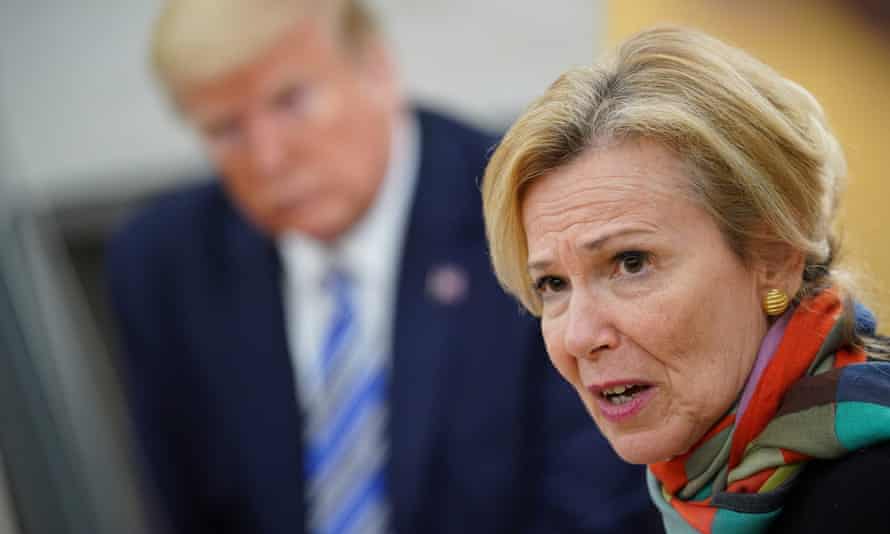Extract from The Guardian
- ‘There were people who definitely believed Covid was a hoax’
- ‘A massacre, a horror film’: inside Brazil’s Covid disaster

Last modified on Mon 25 Jan 2021 04.17 AEDT
The former US coronavirus response coordinator Deborah Birx has said people in the Trump White House considered Covid-19 a hoax.
Birx questioned the Trump administration’s response to the coronavirus pandemic in a wide-ranging interview broadcast on Sunday. Elsewhere, advisers to Joe Biden described the new president’s plans to control Covid-19 – a challenge made tougher, chief of staff Ron Klain said, by Trump having left office without a vaccine distribution plan in place.
More than 417,000 people have died of Covid-19 in the US, out of a caseload of nearly 25m, according to figures kept by Johns Hopkins University in Maryland.
In the White House and in the broader public “there were people who definitely believed this was a hoax”, Birx told Face the Nation, on CBS.
The former army physician attributed some such skepticism to people’s different experiences with the virus.
“They saw people get Covid and be fine and then they had us talking about how severe the disease is and how it could cause these unbelievable fatalities to our American public,” she said.
The process to distribute the vaccine … did not really exist when we came into the White House
Asked if she blamed some such skepticism on Donald Trump, who repeatedly downplayed the virus, Birx said some statements by political leaders “derailed” the coronavirus response.
“When you have a pandemic where you’re relying on every American to change their behavior,” she said, “communication is absolutely key, and so every time a statement was made by a political leader that wasn’t consistent with public health needs, that derailed our response. It is also why I went out on the road, because I wasn’t censored on the road.”
Birx, who played a key role in the fight against Aids, said she believed the 2020 election was a factor in how information about the coronavirus was shared and that she had “always” considered quitting her White House role under Trump.
“I always feel like I could have done more, been more outspoken, maybe been more outspoken publicly,” Birx said. “I didn’t know all the consequences of all of these issues.”
Birx has long promoted a data-driven response to disease outbreaks and she suggested such efforts were undermined by people working in the Trump White House. From the time she arrived until she left, she said, unknown advisers were supplying “parallel” coronavirus data.
“I saw the president presenting graphs that I never made,” Birx said.
Efforts to vaccinate the public have been plagued by delays while a new and more contagious variant of coronavirus that originated in Britain has been identified in at least 20 states.
On Sunday Dr Anthony Fauci, the director of the National Institute of Allergy and Infectious Diseases who also served under Trump but unlike Birx has transitioned to advising Biden, told CBS: “The Moderna and Pfizer vaccines seem to continue to be protective against the mutant strain.”
He also said a “mutant” virus variation “now prevalent in South Africa” was “a little bit more concerning”.
“It looks like it does diminish more so the efficacy of the vaccine,” he said. “But we’re still within that cushion level of the vaccines being efficacious against these mutants.”
On Thursday, the first full day of his presidency, Biden released a 198-page Covid-19 strategy. He has also signed 10 related executive orders or other directives since taking office. The White House said it aims to provide 100m vaccine doses in 100 days.
Biden’s nominee for surgeon general, Dr Vivek Murthy, told ABC’s This Week the success of the vaccination campaign should be determined by not just by quantity, but also by how equitably inoculations are delivered.
To do this, Murthy said, the government must increase supply by using the Defense Production Act and better targeting distribution with mobile units and community vaccination centers.
“We already know from the Covid crisis over the past year that there are certain communities that have been hard hit by this virus,” he said, “that rural communities have had a harder time getting access to resources, that communities of color have experienced more cases and deaths, that seniors have struggled, especially those in long-term facilities”.
Murthy also called for a greater investment in treatment strategies, contract tracing and testing. Such efforts combined with people getting vaccinated and adhering to public health guidance, he said, could allow the US to control the pandemic.
“If we do these things, and if we continue to work on taking the safety precautions, like masking and avoiding indoor gatherings of people outside your household, then I think we can be on a path to not only turning the pandemic around, but, most importantly, getting our schools open, our workplaces back up and running, and regaining our way of life.”
Biden’s nominee for health secretary, Xavier Becerra, warned that improving the pandemic response “won’t happen overnight”.
“We can’t just tell the states, ‘Here’s some PPE, some masks, here’s some vaccines, now go do it,’” Becerra told CNN’s State of the Union.
Klain, Biden’s chief of staff, told NBC’s Meet the Press: “The process to distribute the vaccine, particularly outside of nursing homes and hospitals out into the community as a whole, did not really exist when we came into the White House.”
Klain said obstructions to better distribution include the need for more vaccines, more people to administer shots and more sites to provide it. Klain said the Biden administration was focused on convincing people who are vaccine hesitant, particularly in communities of color, that the vaccine is safe.
“Unless we can reduce vaccine hesitancy,” he said, “unless we can get all Americans to take this vaccine, we’re going to continue to see Covid be a problem in our country.”
No comments:
Post a Comment